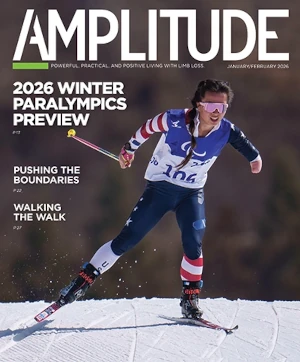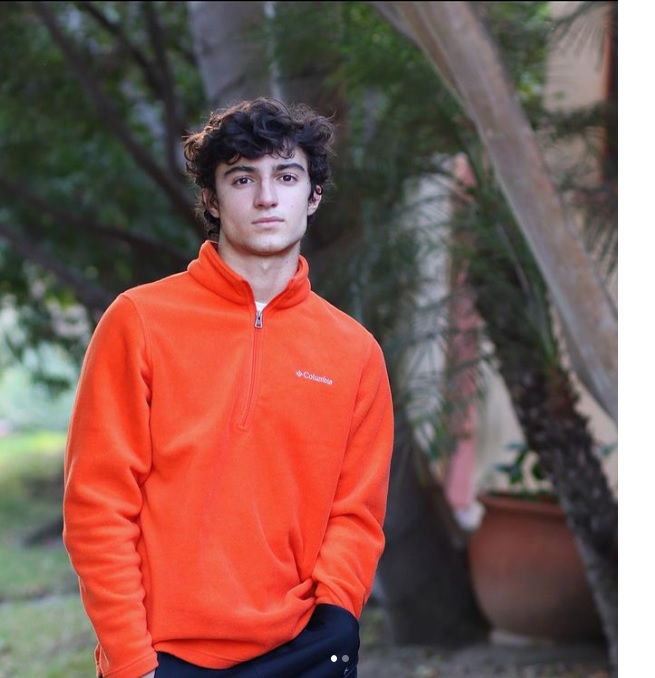
He won’t turn 16 until May, but Ezra Frech already has a higher profile than most Paralympic athletes. As the co-founder of Angel City Sports, Frech (rhymes with “tech”) has helped open doors to athletic opportunity for thousands of people with limb difference and other disabilities. After grabbing silver medals in the long jump and high jump as a 14-year-old at the 2019 Parapan Games, he was poised to compete in Tokyo as one of the youngest US Paralympians ever. The pandemic postponement briefly threw Frech into a funk that, he says, felt like a romantic breakup. But he rebounded quickly and used the extra year to become a more confident competitor and bigger Paralympic medal threat.
If you’re not familiar with Frech’s backstory, here’s a quick take. Catch up with him on Instagram, Facebook, and Twitter at @teamezra05. We caught up with him a couple of days ago. Our conversation is edited for clarity.
You mentioned you’ve got to go to high school track practice after we talk. Do you know if your team will be allowed to compete this year?
We are fairly optimistic that there will be a high school season. Track and field is one of those sports where it’s a little bit easier to stay socially distant than in basketball or soccer or football, so we’re optimistic that we’ll be able to get back to track meets.
Take me back 11 months to last March, before all the shutdowns occurred. What did your competition and training calendar look like at this time in 2020?
It’s pretty weird to look back. I was preparing for high school competitions—I think it was the beginning of practice, and I was just starting to get back on the track after the World Championships in Dubai in November. I do remember having this jittery, nervous feeling about the upcoming season. So it was a similar point to where I am right now. But obviously things are much different. The lifestyle is completely changed.
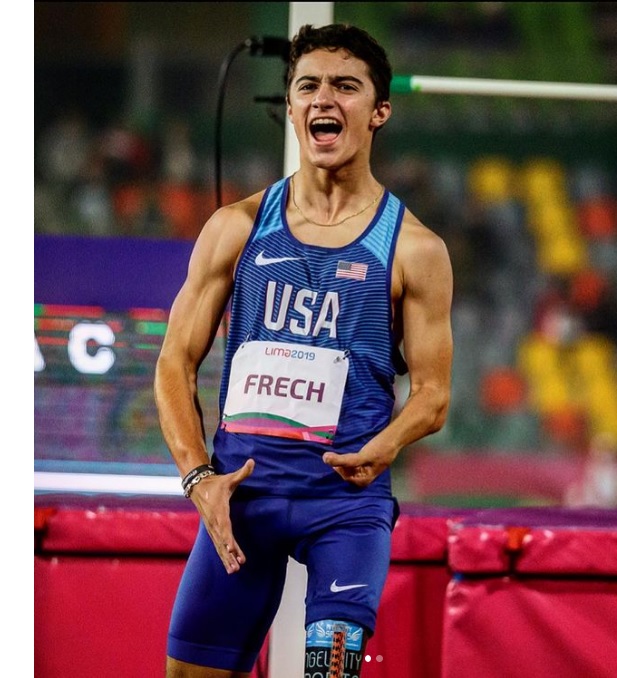
Walk me through the sequence of quarantine getting imposed, and then the Games getting postponed a few weeks later. How did your mindset evolve, and how did you adapt your training to adjust to the new timeline, the closing of facilities, and everything else that unfolded last spring?
It was definitely a wild experience, to say the least. At the beginning of the lockdown, when we were hoping the Games would still happen, I was still very motivated. Once I found out the Games got postponed, it was mixed emotions. I had been super psyched to be going to the Games at [age] 15. That was a huge thing for me. I was like, “This is the season. This is the moment.”
So I was kinda sad at the fact that I wasn’t able to compete. I went through a few weeks where I was just the least motivated person ever. I just sat on my couch. I did nothing. I didn’t even want to think about track. It gave me such a lousy feeling, because I had trained so hard, we had spent so much time preparing, and now suddenly it’s [not until] next year and I’m just sitting here with nothing to do. So I was not motivated. I wasn’t working out, I wasn’t eating right. I was just in this slump where I didn’t want to do anything.
But at the same time, I was also a little bit grateful the Paralympics didn’t get completely canceled, and I still had the chance to compete. It just gave me another year to come back stronger and faster, hopefully be higher up in the rankings and improve my chance at medaling. So I talked to my coach, and we basically snuck onto this track and began working out. But we didn’t train like [we would for] a normal season. We more built from the bottom instead of spending all the time on the track. We really dialed in the form, dialed in the mechanics of everything, and thought things through so we would be in good shape leading into this track season.
As far as finding a place to train, that’s possibly one of the most difficult things I’ve ever done in my entire life. LA was in and out of lockdown. This track closes, that track opens, this park is not allowing people, you know, and we’re going from park to beach to anywhere we could find—on my street. I’ve got spikes on my blade, so I could technically only run on grass or track. We couldn’t find a weight room, and half the time when we found one then it got closed. It was like this whole mess scrambling to find a place to train, and the training plan was constantly getting adjusted depending on what location was open that day. Like, really, some days we’d have a training planned for 3:00, and at 2:30 we would be like: “The track just closed. Where to?” And we’d find some random patch of grass on some random place and run there just to get in the work. We were just all over the place until very recently—like, we were still scrambling in January. Now we’ve got a good training spot and we’re good to go, but it was a crazy, crazy experience.
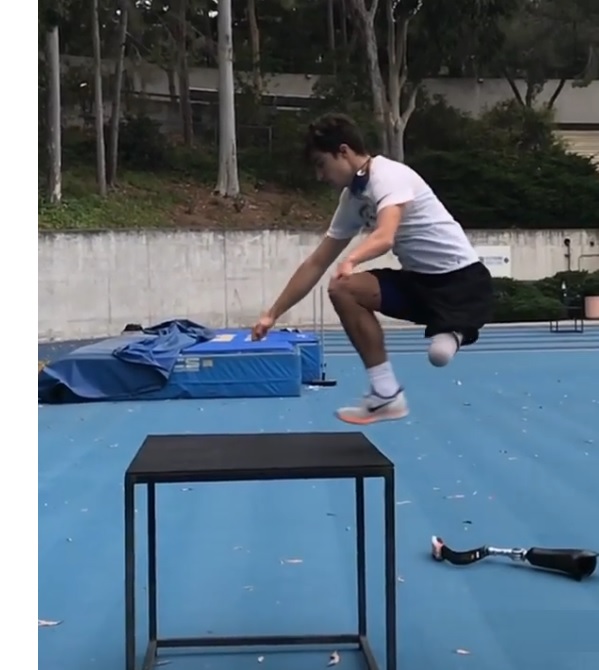
I want to circle back to this initial wave of disappointment and apathy you described. How did you talk yourself out of that? You mentioned that connecting with your coach was a good step. Did you have any other people you could talk to for help to climb out of that initial pit of disappointment?
It was a mixture of a few things. I’m not the same person when I’m not working out. I was grumpy. I was just not up for anything. I didn’t really wanna talk to anyone. It was just sort of this wave of sadness, kind of like when you go through a breakup or something like that—when the girl says, you know, “Let’s take a break.” That’s what it was like for me—the Paralympics said, “Let’s take a break.” That’s really how I felt.
And then on top of that, I was sitting at a computer for seven hours a day doing online school. I couldn’t see my friends, all this bad news was happening in the world. It was brutal. It was definitely not the best two or three weeks, however long it was.
Then I looked on Instagram, and these other guys around the world were still training, still getting after it. And I was like, “What am I doing? I just wasted two weeks. What was I thinking?” And that fired me up. I went through all that and got back out of it, and it was like: Okay, I’m ready to go now. That led to me feeling a lot better over the rest of quarantine.
I was gonna ask if you see any benefits to the way this all played out, and you’ve already alluded to a couple of things. Looking back on it, is there a sense in which this might have ended up being a good thing?
I truly feel that everything happens for a reason. And in this case, you know, this whole pandemic stinks. But I’ve learned so much more about myself than I ever would have. I came out stronger, and I definitely learned a lot about my training, a lot about my habits. The pandemic has taken away this sort of short-term gratification that you would get from going out with your friends and things like that, but it’s helped me work on the long-term gratification of bettering myself—strengthening my friendships with the people I’m closest with, becoming a better athlete, becoming more technically sound and smarter with how we’re working out and how we’re training so we can ultimately be more productive.
It has been difficult, and it’s gonna continue to be difficult. There’s no magic saying to take away the suffering and pain the pandemic has caused for so many people. But everything happens for a reason. I was the most motivated I’ve ever been. I took track more seriously than I ever have before. I completely immersed myself in this sport at a whole new level, even more than before. And I was grateful to come out stronger and better able to go after my dreams.
Have your goals changed? When you think back a year ago to what goals you had set for your performance in Tokyo, do you have different goals now?
They’ve changed drastically. Significant difference. Going into the 2020 season, I had just come off two eighth-place finishes and one seventh-place place finish in Dubai at the World Championships. And I was coming into Tokyo with this sort of attitude like, “I’m this youngster, I’m just gonna have fun and do my best. If I medal, I medal.”
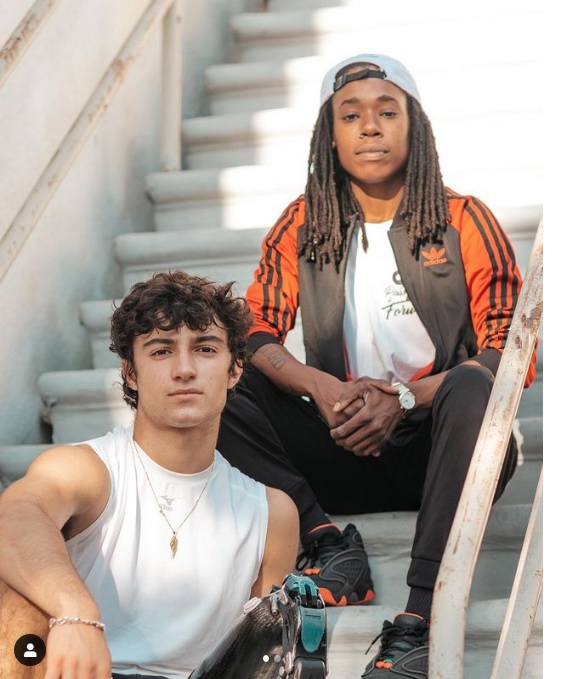
coach, LaTi Avery
That has completely changed. You know, this is fun, but it’s also business. It’s like a job to me. It’s like my profession. So the goals of what I wanted to accomplish in the 2020 season have changed a lot. Granted, I’m still very young compared to the other guys. But as far as my mentality, I’m not coming into Tokyo hoping to medal. I know it’s gonna happen. I know what I’m capable of. I know how it’s gonna go down. I’ve seen it in my head thousands of times over the past year. It’s not anything remotely close to what I would have thought could be possible last year. It’s changed because of what we’ve been able to do and the way we’ve structured our training plan this year. I’ve been able to set realistic goals for myself that are significantly higher than what my realistic goals were last year.
Do you have an independent coach for your international competition? I assume that’s not the same coach as your high school coach—or is it?
It actually worked out very nice. Two years ago I was at this middle school track meet, and I met this coach from the other school and we hit it off. She was amazing. Like, you know when you meet someone and you have that genuine connection? That’s what I felt with her.
And what’s her name?
LaTi Avery. She basically is the reason that I even made Team USA in 2019 at all. She skyrocketed my performance, and we’ve been working together ever since.
Since we’ve been working together, she got the job as my high school jumps coach. So she not only is my private coach and trainer, she also is the coach I work with when I go to high school practices. So it’s worked out very nice.
Another question on my list is about role models. Is there an athlete that you feel like you want to emulate as a competitor, or you want to have a legacy like them, or whatever it might be?
Within the Paralympic community, the person who I really look up to is Sam Grewe. He’s a high jumper on Team USA with me. He’s in my same classification. We competed together in Peru, and we competed together in Dubai. At the Pan American Games we went one-two—he got gold, I got silver. And he has been a very big influence on me. He’s been a huge mentor for me throughout this whole process of coming on to the Paralympic scene and making the team. He’s basically like a big brother to me. We text constantly, he’s always looking out for me, and I learn a lot from him. He’s the world record holder, multi-time world champion, and hopefully Paralympic champion in Tokyo. I feed off his energy at competitions.
As far as the athlete I would like to leave a legacy similar to—this is not even in track and field, but the UFC fighter Conor McGregor. He’s become one of the most famous athletes on the planet and put the Ultimate Fighting Championship on the map, and he’s spearheaded this movement and inspired this new wave of UFC fighters. I hope to be a part of something similar within the Paralympic movement, where my success leads to the success of people and kids with disabilities all across the world. I’d like to help make the Paralympics just as mainstream and popular as the Olympics, because it truly deserves to be. It changes lives, and it helps normalize people with physical disabilities and show that we can do pretty much anything, which is not always the public perception.
Another one I would say is Pau Gasol. He was my favorite NBA player, and I ended up getting to meet him when I was younger. We’ve become very close with him over the years. As well as being one of the most hard-working people I’ve ever met, he treats every single one of his competitors with dignity and respect. He’s just the most down-to-earth guy. You know, he’s won NBA championships, he’s made all the money, he’s done all this stuff. But he is still the most down-to-earth, respectful competitor. So as I continue to compete and continue to, hopefully, move up in the rankings, I hope to stay as grounded as he is.
It’s interesting you mentioned Conor McGregor, because to the extent I know anything about UFC, it’s because of that guy. That’s not a sport I ever followed, but he’s kind of transcended that sport and made people more aware of it.
Exactly. Yeah.
So one big possibility for achieving that kind of breakout for adaptive athletics in the US and getting people more aware of them and more interested in them is the 2028 Olympic and Paralympic Games in Los Angeles. Is that at all on your radar? Or is that just too far in the future to even think about at this point?
No, that is 110% on my radar. It is one of the things I’m looking forward to the most in my entire life. I think about it all the time. My family’s organization, Angel City Sports, is trying to build this community that understands Paralympic sport and understands the movement, so that when the Games come to LA in 2028, the city is excited about hosting the Paralympics. You know the Olympic stands will be filled [when the Games come to LA]. We want the Paralympic stands to packed full as well.
As as far as myself, I’m very much looking forward to competing in my hometown in front of my family and friends, because a lot of those people aren’t gonna be able to fly to Tokyo or Paris to watch me compete. In my home city, I’m pretty sure half the audience will be my family.
Road to Tokyo: Previous Interviews
Nichole Millage Keeps It Flying (Feb 10)
Melissa Stockwell Stays the Course (Feb 3)
Hunter Woodhall Gets Back to Business (Jan 27)
Allen Armstrong Soldiers On (Jun 10, 2020)
Lacey Henderson Looks Ahead (April 22, 2020)
MeiMei White Video (Mar 4, 2020)


